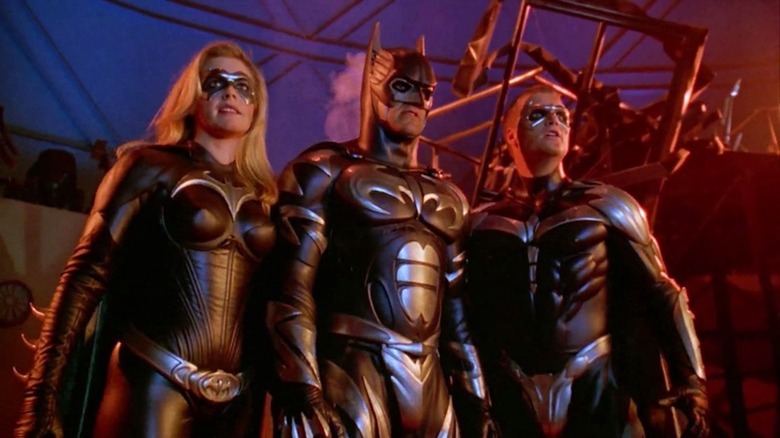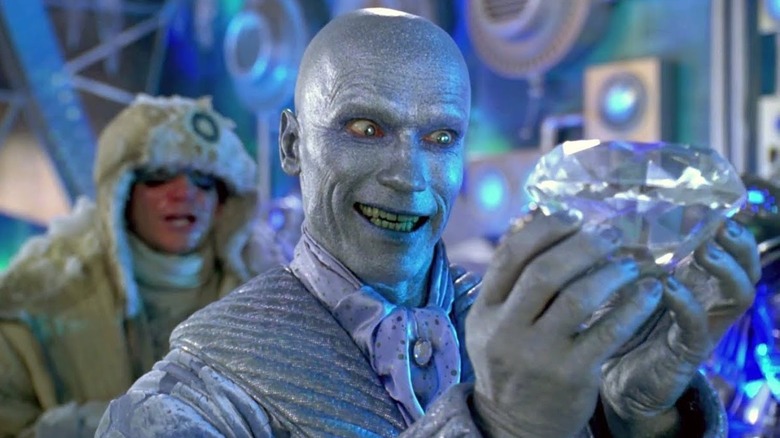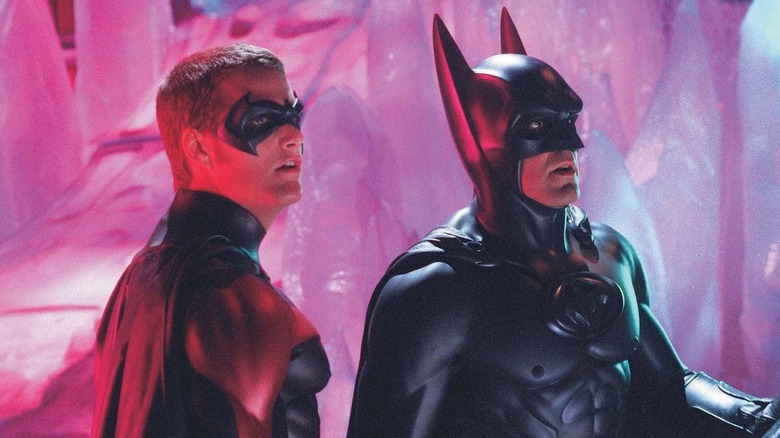Star Trek's Akiva Goldsman Knew Batman & Robin Wasn't Working From The Start
Warner Bros. felt like they'd dodged a bullet in 1995 when Joel Schumacher's "Batman Forever" breathed box-office life back into their still-young Caped Crusader franchise. Though Tim Burton's "Batman" was an unprecedented commercial phenomenon in 1989, his 1992 sequel, "Batman Returns," fell $150 million short of the first movie's worldwide take. Audiences were turned off by the film, while McDonald's was so disturbed by the movie's dark tone that they canceled their Happy Meal tie-in.
As a course correction, the studio brought in Schumacher (with the tremendously relieved blessing of Burton), who embraced the campiness of the 1960s ABC TV series and threw a splash of color into Burton's dour Gotham City. It was a big, bright and goofy film that appealed to families. WB wanted Schumacher to go right back to work on the sequel. So, even though he was set to deliver "A Time to Kill" for the studio in the summer of 1996, they arrogantly set a June 1997 date for "Batman & Robin" and prepared for another superhero windfall.
Even with the presence of Arnold Schwarzenegger, who was then one of the biggest stars on the planet, "Batman & Robin" was panned by critics and loathed by moviegoers. Plagued by an incoherent narrative and cloddishly staged action, the film made less worldwide than "Batman Returns" and put the Dark Knight on ice for eight years until Christopher Nolan dazzled audiences with his top-down reboot "Batman Begins." How did WB and Schumacher get it so catastrophically wrong? That's a very long story, but Akiva Goldsman, who'd written "Batman Returns" and "A Time to Kill" for the director, knew early on they were on the brink of disaster.
The 1997 iceberg everyone saw coming
In a 20th anniversary piece for "The Hollywood Reporter," Schumacher wishes he'd listened to Goldsman's concerns heading into production. "Akiva was very leery about Batman & Robin," he said. "We had a couple of very serious discussions about it, and he was right about it in the long run."
The primary source of concern early on was the telescoped production schedule. With that June 20, 1997 release date looming, there wasn't time for trial and error in terms of cracking the story or anything really. As Schumacher remembered:
"Suddenly you're carrying what's called the tentpole movie of the year. Which means that's going to carry all the other movies. So you are going to open whether you have something or not. Because those spots in the summer are so sought-after and so juggled around that you've got to piss on your ground or you're not going to have dates in the summer. And then it's like, 'Oh my God, I'm opening. But now I have to make something to open with.'"
Their worries were confirmed when they test screened the movie in April. Two months out from release, there was little they could do to repair a movie people outright loathed ... but they were unprepared for an upstart website called Ain't It Cool News to break industry rules and run a savage pan of the unfinished cut that exhorted the film's target audience to avoid the film like it was Three Mile Island. The studio — and, most humiliatingly, the film's talent — now had to spend the next two months pretending they hadn't made a turkey.
Release dates can be changed, but fiascos are forever
It took a while for studios to fully learn the lesson of "Batman & Robin" — and while they're now far more willing than they used to be when it comes to juggling release dates, they still barrel forward on projects hobbled by flawed, unfinished scripts in the hopes they can be reworked before opening day.
They would've been wise to take the counsel of Jon Landau, who, prior to producing two of the top grossing movies in the history of motion pictures via "Avatar" and "Avatar: The Way of Water," oversaw the troubled production of "Alien 3" as the VP of Feature Film Production at 20th Century Fox. In an interview for Charles de Lauzirika's superb "Wreckage and Rage: Making 'Alien 3'," Landau boils down the folly of David Fincher's feature debut, which was similarly rushed to theaters, to one major mistake: "We set out to make a release date, not a movie."
In the case of "Alien 3," the studio compromised what should've been a sci-fi classic (and is still a very good movie) by refusing to move off their Memorial Day 1992 berth. As for "Batman & Robin," given how well WB has done with the character in the 26 years since its release (and how, after being vilified as fandom's public enemy number one for two decades, Goldsman is now celebrated for "Star Trek: Strange New Worlds" and "Star Trek: Picard"), maybe everybody won by losing.


